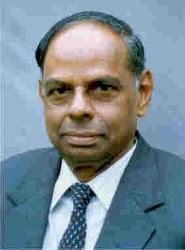 | « Back to article | Print this article |
 Managing inflationary pressures -- particularly in food grain prices -- was the biggestchallenge before the policy-makers, said C Rangarajan, chairman of the Prime Minister's Economic Advisory Council, in Vadodora.
Managing inflationary pressures -- particularly in food grain prices -- was the biggestchallenge before the policy-makers, said C Rangarajan, chairman of the Prime Minister's Economic Advisory Council, in Vadodora.
Rangarajan, former governor of Reserve Bank of India,was speaking on the topic 'the growth path and some concernson the way' at a function at Federation of Gujarat Industries on Monday.
"There are a few areas where immediate engagement of thepolicy-makers is needed.
"In the short run, managinginflationary pressures, particularly foodgrain prices, is thebiggest challenge," he said.
"We also need to watch out what happens to crude pricesin the global markets. We must remain committed to maintaininginflation at a low level."
Saying that he did not subscribe to the idea that high growth demanded higher level of inflation, he stated, "We must use all of our policy instruments -- interventions in the grain market, fiscal and monetary policies -- to bring down inflation further and re-anchor inflationary expectations tothe 5 per cent comfort zone."
The second concern, he said, was the balance of paymentsas the current account deficit had remained very high at 3.7per cent of the gross domestic product in the first half of 2010-11.
"Efforts must be made to bring down the current account deficit to amore manageable level of 2.0 to 2.5 per cent of GDP."
This, he said, was desirable to impart much-needed stability on the external payment front and to reduce the risk to domestic economy from volatility in international financial markets.
Another critical challenge was fiscal consolidation which was a necessary pre-requisite for sustained growth, he said.
In the wake of international financial crisis, India, like many other countries, adopted an expansionary fiscal policy to stimulate demand.
Consequently, the fiscal deficit which was coming down started rising; in 2008-09, deficit was 6 per cent of GDP, it rose to 6.4